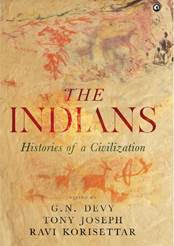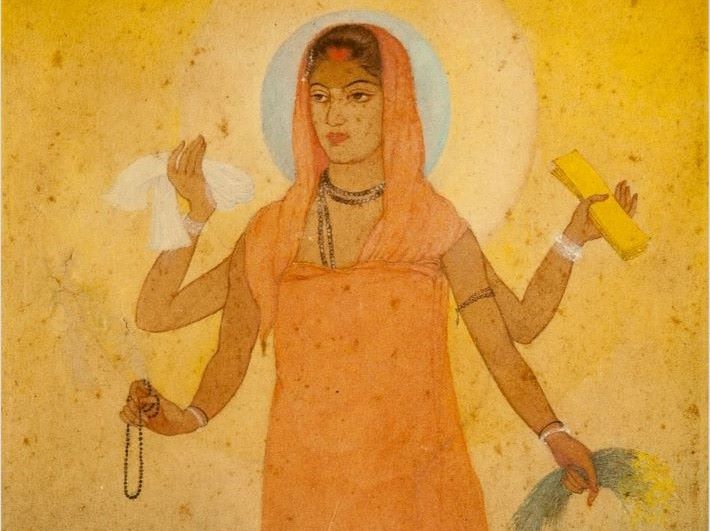101 essays from top scholars cover a broad range of archeology, anthropology, linguistics, history and politics of our land over the past 12,000 years
The Indians: Histories of a Civilization
Edited by G. N. Devy, Tony Joseph, and Ravi Korisettar
Aleph, 648 pages, Rs 1,299

How do we map the origins, evolution, and present-day reality of India’s civilization and people during a period of about 12,000 years – from the last Ice Age to the twenty-first century? The book under review is arguably the most ambitious project of its kind undertaken to answer that question. More than a hundred of South Asia’s foremost scholars have contributed essays in it, addressing non-specialist readers and equipping them to make sense of our collective identity on the basis of scientific and scholarly research.
Why should we map the origins, etc., and why 12,000 years? It begins with an innocuous-sounding official news release.
The Press Information Bureau (PIB) of the government issues several news releases every day, relating to various governmental activities. On 14 September of 2020, a PIB release [https://pib.gov.in/PressReleasePage.aspx?PRID=1654152] stated that the government had constituted an expert committee “for conducting holistic study of origin and evolution of Indian culture to since 12000 years before present and its interface with other cultures of the world”. This was not a new development; the release was based on information given by the minister of state of culture and tourism, Prahlad Singh Patel, in a written reply in the Lok Sabha that day.
A similar committee had been formed in 2017 too, during the first term of the BJP-led government. Both panels have a similar composition – women, SC/ST, the northeast and non-Hindu religions were missing from both. While it is not clear what happened to the first panel, a Reuters report quoted from the official minutes of a January 2017 meeting of it: its task was “to use evidence such as archaeological finds and DNA to prove that today’s Hindus are directly descended from the land’s first inhabitants many thousands of years ago, and make the case that ancient Hindu scriptures are fact not myth.”
If this were a scientific project, then what “needs to be proven” could not have been stated upfront. So, it should be clear to all that this is a political project, and thus it will derive non-scientific conclusions.
For a government that swears by a version of nationalist ideology, such an enterprise should not be unexpected. Rewriting history is, anyway, has been attempted before as well. What many scholars may find disturbing is the reference to DNA. There is more than a hint of putting pseudo-genetics at the disposal of ideology. When it happened the first time, in Germany in the 1930s, the results were altogether traumatic.
Ganesh Devy, a cultural activist whose accomplishments include spearheading the ambitious People’s Linguistic Survey of India (PLSI) project, was among those who found these committees’ proposed proceedings alarming. He wrote about it in his columns for newspapers and spoke about it in interviews and lectures. Then, he thought of putting together what we Indians know – scientifically – about ourselves over the past 12,000 years: Our history, culture, languages, society and political movements as well as the archeological and genetic basis of this knowledge base.
The idea was to approach about a hundred experts from various domains and invite them to write a short essay each on a selected aspect of our common identity as Indians. For expertise relating to more scientific themes, Devy also invited Tony Joseph and Ravi Korisettar to serve as co-editors of the proposed volume. Joseph, formerly editor of ‘Businessworld’ and associate editor of ‘Business Standard’, wrote ‘Early Indians: The Story of Our Ancestors and Where We Came From’ (2018), which has garnered much critical praise. Korisettar is an archaeologist and adjunct professor at the National Institute of Advanced Studies, Bengaluru, whose publications include ‘Beyond Stones and More Stones: Defining Prehistoric Archaeology’ (2017).
An early glimpse of the work could be had in a discussion meeting held early October 2022 in New Delhi, in which a range of scholars and activists – from Ashis Nandy to Sitaram Yechuri – shared their views on the question. Now, the much-awaited volume is out.
‘The Indians: Histories of a Civilization’ is, as Devy writes in the introduction, “conceptualized to provide adequate space for histories of various regions, faiths, and languages that constitute the ‘idea of India’ founded in immense diversity.” It is divided into seven parts:
PART I: THE EVOLUTION OF HUMANS AND THEIR LIFE CONDITIONS looks at the evolution of humans in South Asia through the lens of the early ‘Indian’ population, their migrations, and the climate. PART II: FOUNDATIONS, EMERGENCE, AND THE DECLINE OF CIVILIZATION focuses on the emergence of different civilizations in the region through the domestication of plants and animals and other factors and how these civilizations eventually begin to decline. PART III: THE LANGUAGE MIX AND PHILOSOPHIES IN ANCIENT INDIA discusses the languages and philosophies that defined ancient India—Buddhism, Jainism, Sanskrit, Indo-Iranian languages, and Pali literature, among others. PART IV: CULTURES, SUB-NATIONALITIES, AND REGION is a detailed study of society and culture in various geographical regions––the North, South, Northeast, the Deccan, East, and West India. PART V: COLONIALISM looks at the advent of colonialism and its impact on the country’s economy, social fabric, and knowledge systems. PART VI: TOWARDS FEDERALISM—SOCIAL AND POLITICAL MOVEMENTS looks at Adivasi movements, Ambedkarite politics, Gandhian resistance, and other events that would come to form the bedrock of the independent republic. And, finally, PART VII: INDIA SINCE INDEPENDENCE looks at contemporary India––the workings of the Constitution and urbanism, liberalization, and other aspects of the modern Indian experience. Taken together, the essays in the book provide remarkable insights into Indian history and society.
The selection of topics covers a fair overview of India and its people over the past 12,000 years, though, of course, stress on one aspect (or lack of it on another) can be open to argument, which is obvious in a work of such a massive scale. As for the authors, more often than not, the most authoritative names in the given field have contributed here. Hans Henrich Hock, for example, the renowned Sanskritist, has authored more than one essay. On Partition, there are two relatively short but succinct essays by Rajmohan Gandhi and Sugata Bose that leave the reader rethinking the accepted wisdom on that theme. One hundred and one essays – an auspicious number – are bookended by an introduction from Devy and an afterword by Vinay Lal.
The volume will thus serve an ‘intelligent lay reader’ as well as a scholar seeking to familiarize themselves with adjoining branches of knowledge. It will serve as a repository of our knowledge bases about India’s civilization, and also as a guard against politically motivated projects to undermine it.
